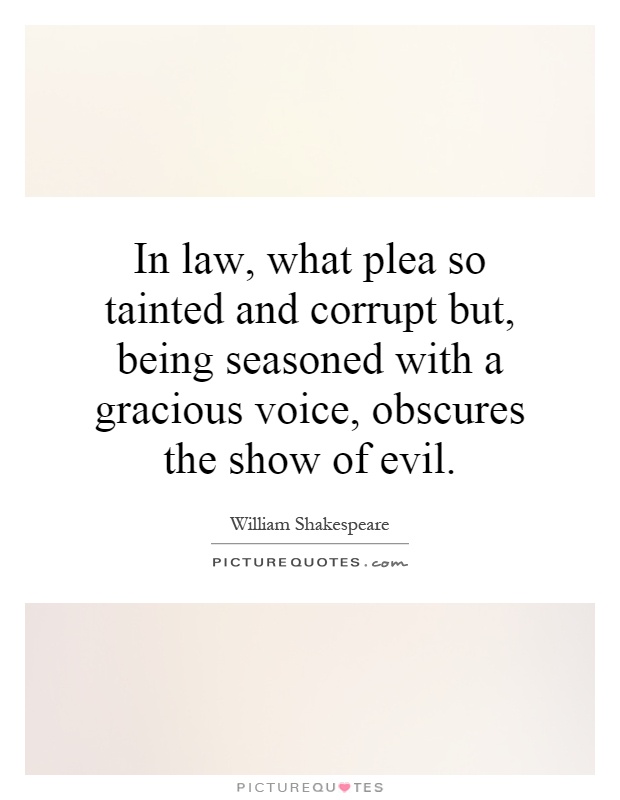In law, what plea so tainted and corrupt but, being seasoned with a gracious voice, obscures the show of evil

In law, what plea so tainted and corrupt but, being seasoned with a gracious voice, obscures the show of evil
William Shakespeare, often hailed as one of the greatest playwrights in history, had a deep understanding of human nature and the complexities of the legal system. In his works, he frequently explored themes of justice, morality, and the manipulation of language in legal proceedings. One of the most famous quotes related to this topic comes from his play "The Merchant of Venice," where Portia declares, "In law, what plea so tainted and corrupt but, being seasoned with a gracious voice, obscures the show of evil."This quote speaks to the idea that even the most corrupt and dishonest pleas can be made to appear legitimate and just when presented with eloquence and charm. In the context of Shakespeare's plays, this theme is often explored through characters who use their wit and rhetorical skills to manipulate the legal system for their own gain. For example, in "Measure for Measure," the character Angelo uses his position of power to enforce strict laws against immorality, while secretly engaging in the same behavior himself. His smooth and persuasive speech allows him to justify his actions and maintain a facade of righteousness, despite his true intentions.
Shakespeare's exploration of the relationship between language and justice is particularly relevant in the context of his time, when the legal system was often manipulated by those in power to serve their own interests. The use of rhetoric and persuasion in courtrooms was a common practice, and Shakespeare's plays reflect the ways in which language can be used to obscure the truth and manipulate outcomes.
Furthermore, Shakespeare's quote also highlights the importance of appearances and perception in the legal system. In many of his plays, characters are judged based on their outward behavior and speech, rather than their true intentions. This theme is particularly evident in "Othello," where the protagonist is manipulated by the villainous Iago into believing that his wife, Desdemona, has been unfaithful. Iago's ability to deceive Othello through his persuasive language ultimately leads to tragic consequences, highlighting the power of words to shape perceptions and outcomes in legal proceedings.
Overall, Shakespeare's exploration of the relationship between language, justice, and morality in his plays continues to resonate with audiences today. His keen insights into the ways in which language can be used to obscure the truth and manipulate outcomes in legal proceedings serve as a timeless reminder of the complexities of human nature and the challenges of seeking justice in a flawed world.












 Friendship Quotes
Friendship Quotes Love Quotes
Love Quotes Life Quotes
Life Quotes Funny Quotes
Funny Quotes Motivational Quotes
Motivational Quotes Inspirational Quotes
Inspirational Quotes